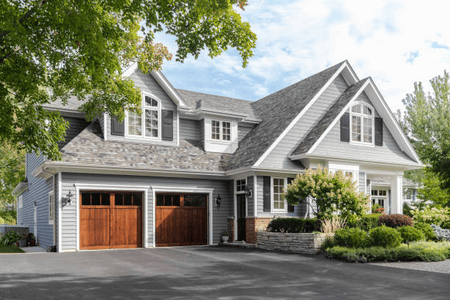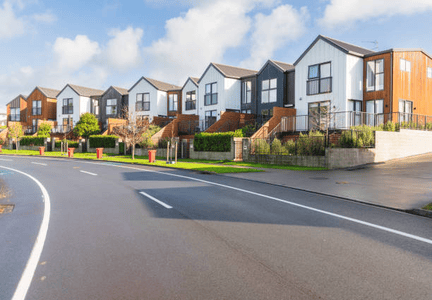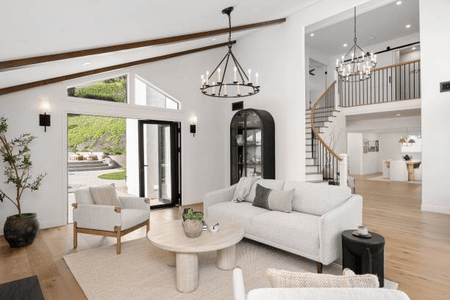10 Factors That Influence Home Value
Here are 10 key factors that can affect the value of a property being sold:
1. Location
The location of a property plays a crucial role in its value. Homes in desirable neighborhoods with good schools, low crime rates, easy access to public transport, and close proximity to amenities such as shopping, dining, and parks typically have higher market values.
2. Property Size and Layout
The size of the property, including both the lot and the living space, impacts its value. Larger properties with more bedrooms, bathrooms, and usable space tend to be more valuable. Additionally, an open and functional layout appeals to many buyers.
3. Condition and Age of the Property
A well-maintained home that is relatively new or recently renovated can command a higher price. Conversely, an older or poorly maintained property may require repairs, which could lower its market value.
4. Market Conditions
The state of the real estate market (buyer’s or seller’s market) significantly impacts property value. In a seller’s market with high demand and limited inventory, prices tend to rise. In a buyer’s market, where supply exceeds demand, prices may fall.
5. Upgrades and Renovations
Renovations and upgrades, such as modernized kitchens, bathrooms, or adding energy-efficient features, can significantly increase a property’s value. These improvements make the home more appealing and functional for buyers.
6. Curb Appeal
The first impression of a property matters. The condition of the front yard, driveway, and exterior of the home can influence potential buyers’ perception of its overall value. A well-kept exterior can set the tone for a positive showing.
7. Comparable Property Sales (Comps)
Recent sales of similar properties in the same area (comparable sales or "comps") are one of the most important factors in determining the value of a property. Buyers and appraisers often use these sales to gauge a fair price.
8. Economic Factors
Broader economic conditions, such as interest rates, inflation, and employment levels, can impact a buyer’s ability to afford a property. Higher interest rates, for example, may decrease demand for homes, lowering property values.
9. Zoning and Future Development
Zoning laws and the potential for future development or changes in the area can affect a property’s value. Properties near planned infrastructure improvements or commercial developments may see their value increase, while nearby construction can also be a detractor if it changes the neighborhood’s character.
10. Supply and Demand
The balance between the number of properties available and the number of buyers in the market influences property value. If demand for properties is high and supply is low, prices will rise, and vice versa.
These factors, whether independent or combined, all play an important role in determining the market value of a property when selling.
Both homeowners and buyers should be aware of what impacts home value. Understanding various elements that can influence a property's value can help them make informed decisions. The extent to which home prices change is determined by the location and what the home includes. Let’s have a look at the ten things that can affect home value the most. All of this is key for anyone looking to buy or sell a home.
The most important thing for a home’s value is its location. Homes in desirable locations appreciate in value over time, making them good investments. Buyers usually want places near things that matter, such as stores, parks and schools. Having these close by makes a property more desirable.
Property prices are elevated in established neighborhoods. Such areas typically feature mature trees and landscaping, well-maintained streets, and a community vibe that attracts prospective buyers. The overall appearance of the area is an important factor in its desirability. Well-kept, maintained space attracts buyers with property values.
Access to public transportation is one of the other essential attributes of location. Especially homes near transit alternatives, for example, bus stops or stations, are worth more as they are closer. One of the factors that can increase a home's value is the ones the buyers prefer, which could be commuting to work or other external destinations. Efficient transportation links allow residents to easily and quickly travel to and from these areas, meaning properties are desirable.
Moreover, having top-notch schools close by can bump up the value of homes. When people set out to find a new place, they think about where the children will go to school. That means houses next to the good schools are most preferred, and individuals will pay more for them so their little ones can get a premium education.
It also means neighborhood amenities help determine home values. Properties surrounded by parks, recreational facilities, and cultural attractions provide residents with the chance to engage in leisure and social activities. The availability of such facilities encourages a busy life and enriches the general atmosphere of residents.
The size of a house has a big impact on its value. Bigger homes with more square feet cost more than smaller ones. People looking to buy often want spacious living areas that fit their needs. A bigger house lets you have more rooms and flexible spaces, which families or residences who like to have guests over find appealing.
How well a home is laid out also affects its value a lot. Open floor plans and designed spaces make a home livable by creating a welcoming feel. Potential buyers like to focus on houses with practical layouts that use space aptly and do not waste much other than the required areas. Homes that connect living and kitchen areas are frequently spacious and more connected.
Outdoor space adds additional value to a property, as people can play and relax on yards, balconies, and patios. A livable outdoor area can make a home more appealing by providing residents with space to do outdoor activities or hang out with friends and family. Buyers like to live luxuriously, and properties with lovely gardens or outdoor party spaces appeal to that lot.
A property can also have extra features, such as bonus rooms or flexible space, that increase a property's value. The fact that homeowners have easy choices to work out home offices, playrooms, or guest rooms, all while making little changes, appeals to them. Such properties are preferable in the current market because of their flexibility.
The value of a property depends heavily on its overall condition. Generally, higher appraised homes are well maintained rather than in need of repairs. Properties that need little maintenance upon purchase attract more buyers quickly.
Renovations and upgrades also increase the home's appeal. Buyers who like move-in-ready options often look for modern kitchens and bathrooms. When selling, the higher return on investment comes from investing in improvements.
Underlying issues that can affect value can be remedied through a thorough inspection. Before you list, addressing these concerns can stop potential buyers from being turned off. A property in good condition will attract a better price.
Home values are greatly influenced by market trends. Prices also result from economic factors, interest rates, and housing demand. Buyers and sellers alike need to be informed about local market conditions.
In a seller's market, high demand for houses creates great competition amongst potential buyers, also resulting in higher home values. A buyer's marketplace may also show fewer expenses, meaning that there are more homes for sale than are demanded. If you understand these trends, you can make strategic decisions.
The season can also change the market conditions. Activity may rise at particular times of the year, but it may temporarily change home value. Knowing these trends helps you be in the right location to buy or sell a property at the perfect time.
Convenience and lifestyle are just as important as neighborhood amenities that add value to a home. They are often more desirable if you have properties near parks, recreation facilities, and community centers. As a result, these features attract those who want to live an active life.
Access to quality schools is another big amenity, as many buyers are looking for a place to live and prioritize educational opportunities. Home values appreciate more in time with home values from reputable school districts.
Shopping centers and dining options also elevate the neighborhood’s appeal. This enhances the convenience of residents, resulting in more appealing properties. When buyers evaluate potential homes, those sorts of factors are often considered.
Home values also depend on economic conditions; buyer purchasing power results from circumstances such as the employment rate and the income of people. An increase in demand for housing normally results from a strong economy.
The housing market also depends upon the interest rate. Lower rates mean cheaper borrowing and help with home purchases. On the other hand, higher rates may prevent prospective buyers from entering the market. Local economic growth results in increased property values over time. New residents wanting housing in areas experiencing job growth flood these places. In other words, this demand can raise housing prices in those areas.
Curb appeal is how good a property looks from the street and significantly influences a home's value. A house kept up on the outside makes a great first impression on buyers. Houses with nice yards and fresh paint often sell for more money.
Investing in making your house look better from the street can pay off big when you sell. Even small changes like new siding or front doors can make a home look better. These upgrades help houses stand out when there are many homes out there.
Buyers want to come inside, and a welcoming entrance will make them more excited during tours. The more attractive your house appears, the better a buyer will perceive that your home is and the more your home will be worth. Positive attributes of unique home features also play a role in a property's valuation. Nowadays, buyers prefer modern amenities like energy-efficient appliances or smart homes. These provide comfort while saving on utility costs over the years.
Homeowners insist on having outdoor living spaces to help them relax at home. Expanded usable space for entertaining or leisure activities is obtained by adding decks, patios, or outdoor kitchens.
The high-quality finishes throughout the home add up to the total worth. The new flooring, cabinetry, and fixtures give the space an air of luxury that attracts not just the broad buyer market but more discerning buyers who counter with a willingness to pay more for quality finishes.
The value of a property is greatly influenced by its age. New homes often feature modern looks and current systems that just about everyone finds attractive today. Frequently, these homes require less maintenance than older homes. However, older homes that are full of character and charm can have a lot of value if they're maintained. Buyers looking for something different, such as historical properties, may be attracted to them.
Renovations to older homes make them more marketable while maintaining their old charm. Buyers who are willing to pay a higher price prefer homes and real estate that blend modern conveniences and classic aesthetics.
Different factors, like urban development, lead to changes in location trends over time. New businesses or infrastructure projects may suddenly make an emerging neighborhood grow quickly. Investing in properties in areas that are also up-and-coming can be very profitable. This is because the demand rises, and demand for affordable housing options closer to main employment centers and places of attraction are available.
To wrap up, many factors influence home value, even during any market cycle. If you know these elements, then the process of buying or selling a property becomes easier. Knowing these aspects, always staying informed, and having successful transactions maximize your investments over time.
Homeowners consider location, size, condition, and other market trends to gain insight into what makes real estate valuable today.
At Amo Realty, we understand that determining the right value for your property is crucial whether you're looking to sell, refinance, or simply assess your investment. Our team of experienced professionals is dedicated to providing you with a comprehensive and accurate home valuation that reflects current market trends and the unique features of your property. With in-depth knowledge of the local real estate market, we ensure you receive a fair and competitive valuation that helps you make informed decisions.
Contact us today to get expert insights and personalized service tailored to your specific needs. Let us guide you through every step of the process with confidence.



